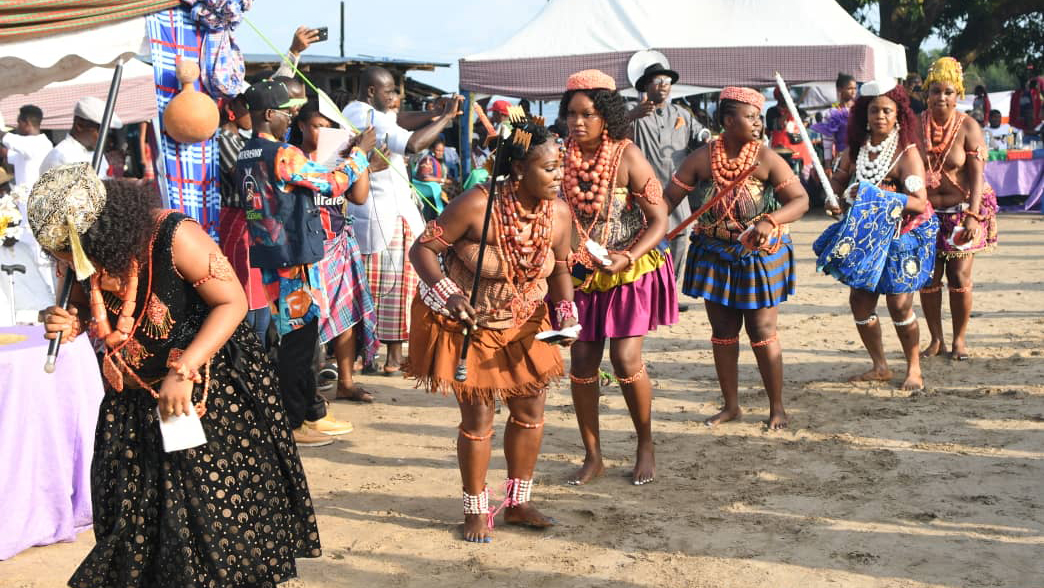There’s a tendency to think Afrobeats is Nigeria’s only sound, especially as it has become the country’s loudest cultural export. But beyond the overwhelming presence of Afropop’s dominance lies a more grounded music tradition that is Nigerian folk music. Though not as widely commercialised or populated by mainstream celebrities, folk music still breathes, gently but persistently, through legendary artists like Beautiful Nubia, and a modernised form in the hands of artistes like Brymo and DOTTi The Deity.
Among this new generation of folk custodians is Adeniyi Olusola Morolahun, known artistically as The Abuletic King and Eyinju Olodumare, whose gifts are nothing short of exceptional. A master percussionist versed in over 35 African drums, accomplished songwriter, and dynamic storyteller, he represents that rare breed of artist whose work serves as cultural preservation and social commentary. His latest offering, ‘Katachi,’ stands as a proof to the enduring power of traditional Yoruba music to address contemporary struggles for truth and justice.
From its opening moments, ‘Katachi,’ establishes itself as something profoundly different from typical contemporary releases. The song begins with The Abuletic King’s resonant voice delivering deep Yoruba lines. His voice carries the weight of traditional griots and keeper-storytellers who have long served as the conscience of their communities.
The entrance of female choral vocals marks a pivotal moment in the song’s development. These voices, reminiscent of traditional Yoruba musical styles, serve as a bridge between past and present, channeling the collective wisdom of generations. The interplay between The Abuletic King’s lead vocals and the female chorus creates a call-and-response pattern that feels timeless.
The instrumental arrangement reveals sophisticated understanding of how traditional elements can enhance vocal storytelling. The lap steel guitar’s gentle rolling patterns provide a melodic foundation that complements the percussion work. Given The Abuletic King’s mastery of African percussion instruments, the rhythmic elements feel particularly authentic.
What elevates ‘Katachi’ beyond simple musical exercise is its lyrical sophistication. The Abuletic King employs traditional Yoruba metaphors with the skill of a master craftsman, weaving complex imagery that rewards careful listening. When he delivers lines such as “Oniro figi ewedu boju aye le,” he’s channeling the philosophical depth of Yoruba traditional wisdom and metaphorical teachings that speak directly to contemporary social issues.
The song’s exploration of truth versus deception becomes particularly powerful through his use of ancestral proverbs. In the second verse, he incorporates the Yoruba adage “Bi iro ba lo fun ogun odun ojo kan ni otito aba”, translating to “If a lie has gone for twenty years, the truth will catch up with it in just one day.” This deep reference to tradition gives weight to his commentary on integrity and the consequences of deception.
Perhaps most impressive is how ‘Katachi’ functions as both artistic statement and social commentary. The Abuletic King has described the song as his “sound of resistance,” and this purpose infuses every element of the composition. Rather than preaching or lecturing, he allows traditional wisdom to speak for itself and also trusting listeners to understand the connections between ancient teachings and modern realities.
The production choices effectively support this vision. The mix allows each element, voice, chorus, guitar, and percussion to breathe and interact organically. ‘Katachi’ represents another folk release, and it stands as evidence that traditional African music forms remain vital and relevant tools for addressing contemporary challenges.
For listeners seeking music that offers aesthetic pleasure and intellectual engagement, “Katachi” delivers on multiple levels. The Abuletic King has crafted a song that will likely grow in significance with repeated listening, revealing new layers of meaning and musical detail. ‘Katachi’ confirms his position as one of Africa’s most important cultural voices.






